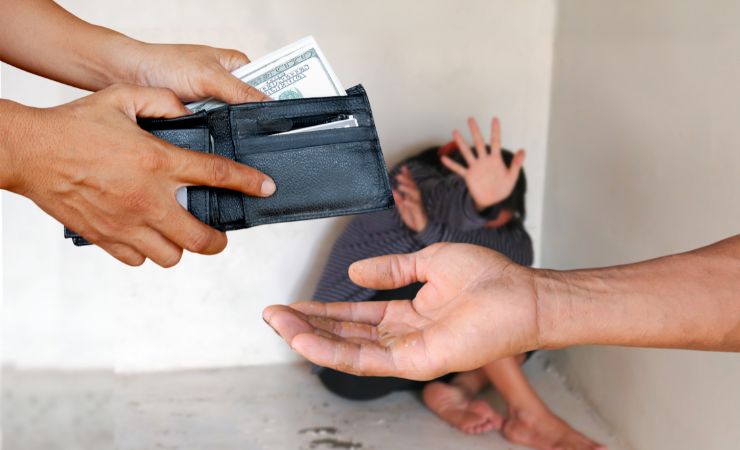Staten Island Sex Trafficking Lawyer

Staten Island Sex Trafficking Attorney
Being charged with sex trafficking crimes in Staten Island can be extremely stressful and disorienting, as the stakes are extremely high. These serious criminal charges can result in up to life in jail, bank-breaking fines, and a permanent criminal record. For this reason, it is critical to work with a Staten Island sex trafficking lawyer who can passionately defend your case.
At The Vitaliano Law Firm, we have years of experience defending clients who have been charged with Staten Island sex crimes, including soliciting prostitution. We have the drive and knowledge to help you work out an ideal outcome for your criminal case. We can work intimately with you to hear about your questions and concerns, then consider the details of your case to craft a strong criminal defense plan.
Sex Trafficking Charges in New York
Sex trafficking is one of the most serious crimes that you can be charged with in New York. It is defined as making an individual take part in a commercial sexual act by forcing or coercing them. It often entails recruiting young people or vulnerable populations into the sex trade with the promise that it will create opportunities to improve their lives.
When going up against New York sex trafficking charges, you want to be sure that you have an experienced sex trafficking attorney on your case. These serious felony charges can result in jail time and fines that will deeply impact the rest of your life.
New York Penalties for Sex Trafficking
New York has strict laws to curb sex trafficking in the state. If you have been charged with sex trafficking, it is recommended that you talk with a sex trafficking attorney who can help you better understand the potential penalty outcomes of your charges.
Some of the following penalties for sex trafficking are:
- First Degree: In New York State, this is the highest level of sex trafficking crime that you can be charged with. It is considered a class B felony and can result in a maximum of 25 years of jail time and paying up to $5,000 in fines.
- Second Degree: In New York, sex trafficking in the second degree is not as serious as a first-degree offense, but it can still result in a maximum of 15 years in jail and having to pay up to $5,000 in fines.
- Third Degree: Someone who is considered to have committed a sex trafficking crime in the third degree did not actively coerce victims into the commercial sex trade, but they earned compensation from the criminal operations. This is considered a misdemeanor offense and can lead to spending up to a year in jail or paying a maximum fine of $1,000.
In addition to the explicit participation and organization of sex trafficking schemes, crimes associated with soliciting a prostitute can be linked to sex trafficking as well. For example, such crimes include:
- Soliciting a Prostitute in the First Degree: If an individual is 21 years old or older, and pays for the sexual services of someone who is less than 15, they are committing a first-degree crime. These felony charges can lead to spending a maximum of 7 years in jail and result in having to pay up to $5,000.
- Soliciting a Prostitute in the Second Degree: If an individual offers to pay for sex, or carries out a sexual act with someone in exchange for compensation, they have committed a second-degree offense. If prosecuted, this felony can lead to a maximum of 4 years in prison and a maximum fine of $5,000.
When an individual is charged with a crime related to sex trafficking or prostitution, not only can they face time in jail, hefty fines, and a criminal record, but they might also have to register themselves as a sex offender.
Being registered as a sex offender can affect a person in the following ways:
- Hinder Ability to Secure Housing: A landlord may be reluctant to rent to someone who is registered as a sex offender.
- Impact on Job Opportunities: Being registered as a sex offender can make it extremely difficult to get hired, especially if the job requires working with young people.
- Restrict Freedom of Travel: Sex offenders will often have to alert authorities when they are leaving New York state.
- Put Strain on Personal Relationships: Being registered as a sex offender can put a strain on existing relationships, and make it hard to establish new ones, due to the taboo and shame associated with such a title.
Because the implications of a sex trafficking charge are strong, it’s important to have a criminal attorney who is experienced in dealing with similar cases. They can help you build a strong defense and minimize the penalties associated with your case.
FAQs
Q: What Are Some Signs of Sex Trafficking?
A: Sex trafficking is not always obvious to spot, but there are some general signs you can look for. Victims of sex trafficking often:
- Seem scared and worried
- Do not seem to have control over themselves, including their items and identification
- Have signs of physical harm on their body
If you see a person exhibiting these signs, they could be a victim of sex trafficking. Another giveaway is if they don’t seem to know where they are, and the person they are traveling with seems to be controlling what they do.
Q: Who Investigates Sex Trafficking?
A: Sex trafficking investigations are complex and can span across multiple government institutions, on both the federal and state levels. Some federal law enforcement agencies involved in the investigation are the U.S. Department of Homeland Security and the Federal Bureau of Investigation. In New York State, police departments on the state, city, or county level can be involved.
Q: Should I Report Sex Trafficking?
A: If you believe that you have witnessed an act of sex trafficking, you should be quick to report the crime to law enforcement. There is also the National Human Trafficking Hotline that you can call. Even if a crime seems mildly suspicious, it is important to report it so that law enforcement can carry out further investigations.
Q: How Does Law Enforcement Investigate Sex Trafficking?
A: Once law enforcement gets a tip, or has reasonable suspicion, they will investigate a sex trafficking case using many different tactics. To create a strong case against sex traffickers, law enforcement will collect important documents, such as financial statements, and forensic evidence. They might also lead undercover missions or carry out surveillance on suspects.
Don’t Wait Until It’s Too Late: Work With a Sex Trafficking Lawyer You Can Trust
The criminal lawyers at The Vitaliano Law Firm have years of experience working on sex trafficking cases like yours. We are here to help you get your charges dropped or minimized so that you can move on with your life. Contact a trafficking lawyer at our firm today to get the advice and support you need during this difficult time.
Testimonials






